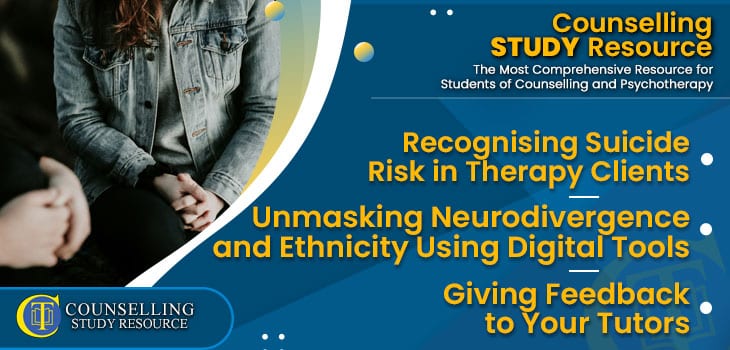See Counselling Skills Used in Real Sessions by Qualified Therapist
Real Sessions – Real Presentations – Real Skills
Gain the competence and confidence to use counselling techniques effectively!

In Episode 306 of the Counselling Tutor Podcast, your hosts Rory Lees-Oakes and Ken Kelly take us through this week’s three topics:
Recognising Suicide Risk in Therapy Clients
Supporting a client who is at risk of taking their own life can be very challenging as a counsellor. In this section, Rory and Ken discuss some ways of recognising if your client is high risk, and the steps you can take to prepare for this:

Real Sessions – Real Presentations – Real Skills
Gain the competence and confidence to use counselling techniques effectively!
In this week’s ‘Practice Matters’, Rory speaks with Lesley Simpson-Gray about unmasking neurodivergence and ethnicity using digital tools such as video games.
The main points of this discussion include:

On-demand access to a rich lecture library covering theory, skills, and professional development for counselling students—Mapped to the UK awarding body criteria
“The Student Library has been BRILLIANT, I can’t recommend it enough!
It has been a lifeline in helping me prepare for practice and my first clients. If you’re considering it, go-for-it, it’s absolutely worth it!”
Kelly – Graduated and now in practice.
It’s common to receive feedback from your tutor, but sometimes you get the opportunity to give them feedback – and you should use it! In this section, Rory and Ken discuss how to give helpful feedback, particularly to your tutor:
Recognising Suicide Risk in Therapy Clients

Get on-demand Certified CPD that is implementable in your practice
